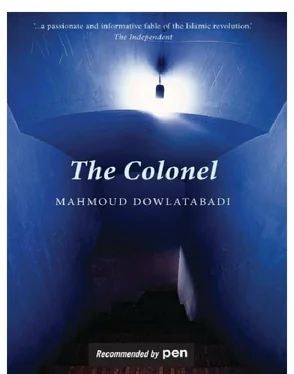I suppose I could suggest that they go and fetch the father or mother of this head so they can put it back where it belongs, but then it occurs to me that this head might belong to a Kurd. This dishevelled half a face is not Masoud’s, I am sure of that. From what’s left of it — the nose and chin and a bit of the forehead — I’m guessing that the owner of this head must have been Kurdish. I’ve seen it in a book, The Faces of Iran I think it was called, which had photos showing the physiognomy and skull structure of the Kurds, which are quite distinctive. Quite apart from that, I’ve seen a few Kurds and have had a bit to do with them. It’s a problem, and not just because I can’t get anyone to listen to me; the problem is that it’s a forbidden subject and I’m sure I daren’t mention it to Qorbani, who seems to be in charge of the funeral arrangements and has implicitly made himself the guardian and owner of the martyr — that is to say, the owner of my son Masoud.
the colonel was quite astounded at the efficient way Qorbani was setting things up and organizing the funeral. One would think his family had been body-washers, gravediggers and carrion eaters for generations. There was nothing he could do about it. This was his fate and it was plainer to him than the lines on the palms of his hands that if he did not accept his lot, they would ram it up my arse and then his problems would be a hundred times worse. He would just have to accept it and agree that that head, a head that does not belong to my Masoud! did belong to him and that it would have to be stuck on to Masoud’s headless body and be buried. That was it.

the colonel had served in the army of the dictator 48(who was nothing but an invisible white kid glove covering a bludgeon up the sleeve of an ancient nation) and he had learned that power was exercised through the business end of that bludgeon, but he had never imagined that a time would come when coercion would come from both ends of the bludgeon. 49But, thought the colonel, he would just have to put up with it. If only he had been better prepared for such times, but they don’t tell you anything! They take you unawares and thoroughly brainwash you until you really believe everything they say .
“Now, young man, will you tell me how to get from here to where everyone else is going?”
“Oh, for heaven’s sake! What kind of question is that? Just follow everyone else. Can’t you see which way the coffins are heading? Are you blind? Just follow the stiffs.”
“No, I’m not blind. I can also hear people’s voices, rattling together like the links of a chain, so I’m not deaf, either.”
But the fact of the matter was that the colonel was feeling a bit dizzy. He thought it was the feebleness of old age, but he could not mention it to anyone in that crowd. What really mattered to him was that he should not be losing his mind. It was no fun getting old. You need to be in my shoes to understand what I’m talking about, what it feels like to be old.
In the procession of biers, he could make out Masoud’s, draped in a silk embroidered cloth, provided through the kind intervention of Mr Qorbani Hajjaj. All forty-one coffins, including Masoud’s, were swathed with black and green bands bearing quotations from the Qoran. They had stacked the bits and pieces of his body and the severed head, like the remains of a crashed car, into a coffin, covered it with an embroidered cloth and stapled black and green bands round the sides. They had raised it up on high and were carrying it in the cortège through the wailing, howling throng. In the rain it looked darker than the others. the colonel tried to remember his son’s coffin so that he could recognise it when it was committed to the earth, I mustn’t lose sight of it, damn it, despite the fact that the conjunction of events had robbed him of any claim to the corpse that bore the name of his son. Mr Qorbani Hajjaj had formally and publicly claimed all title of next of kin, and arrogated to himself all matters of probate, both present and future, pertaining to the death of the martyr. He had stitched everything up beforehand, it appeared.
the colonel struggled to haul himself out of the mud and up on to some high ground before he got trampled by the mob, and he watched the mob and the train of biers held aloft by the pallbearers. Curiosity made him try to count the coffins once more, to see if he had missed one out. He thought that, if there were more, a trouble shared would be a trouble halved, but he quickly abandoned this fantasy and looked away from the procession. Not least because he felt so dizzy, and he could not stand the sight of Qorbani’s hairy arms sticking out of his shirt sleeves, looking like a pair of goat’s legs. Everything went black in front of him. He shut his eyes and waited for the crowd to halt and put the coffins down. He guessed that these graves had been dug in advance. Perhaps the ghosts he had been seeing in the cemetery over the past few nights had been gravediggers at their work.
He rubbed his eyes, but it made no difference. The most sensible thing would be to get away from the crowd and head for home. The bigger the crowd became, the more noisy and chaotic it got. He was cracking up and beginning to feel that neither his son’s corpse nor his death had anything more to do with him. He was a stranger in the crowd. Before he could make up his mind, he found that he was once more firmly wedged in the midst of the mob, shoulder to shoulder, with no way out, backwards or forwards. Where they were putting the coffins down, he could see a contraption like a stage being put up and made ready for speeches. He could just make out Qorbani going to the microphone and, with his very first words, expertly whipping up the crowd into an outpouring of emotion, as if his family had been mullas and carrion-eating professional graveside mourners for generations .
Qorbani launched himself into his funeral oration: ‘Masoud Forutan… this young man, so dear to us, yearned for martyrdom… he swore… that until… extinction… to avenge the blood of… never retreat… on the sacred path… till the last drop of his blood…’ And then he held up Masoud as ‘the very model of righteousness and selflessness, whereas his sister and his brothers Taqi and Amir, well…’
“I’m feeling dizzy.”
the colonel’s world was spinning round and he was trying desperately to cling on to the idea that he had not lost his senses. He remembered that it had been sunny the day they buried Mohammad-Taqi. The sun was so bright that Mohammad-Taqi’s blood turned the colour of mountain honey and the bare arms of the men carrying the flower-strewn coffin to the graveyard were dappled with bright colour, and the shoals of hands and arms reminded him of fish leaping out of the water and dancing for joy before dropping back down again. And in amongst all this, his son’s coffin looked like a piece of driftwood being clung to by a thousand drowning men trying to save themselves from the deep. What a racket they made! They had whipped up the frenzied crowd with such a mixture of threats and exhortation that you felt that these lads flagellating themselves, with blood coagulating on their shirts and in their curly hair, wanted to dive into that flower-bedecked, tapestry-draped coffin and find eternal rest there themselves, in place of Mohammad-Taqi. It would not be far-fetched to say that some of those young men, deep inside, felt short-changed by not being where my martyr hero Mohammad-Taqi was. He had no idea where his other children had got to in that raging sea of people. He guessed that the young lads had sucked them in. Every so often, one of their faces would catch the sunlight and float briefly into his field of vision, only to disappear once more. But Parvaneh was nowhere to be seen, because she had been swallowed up entirely by waves of black-clad women. Once or twice he saw Farzaneh’s face coming up for air and disappearing out of sight again. The last time he saw Farzaneh and Parvaneh together, he noticed that they had lacerated their faces with their fingernails and fresh warm blood was streaming down their faces, shining like golden honey in the dazzling sunlight. What an unexpectedly sunny day that was!
Читать дальше













